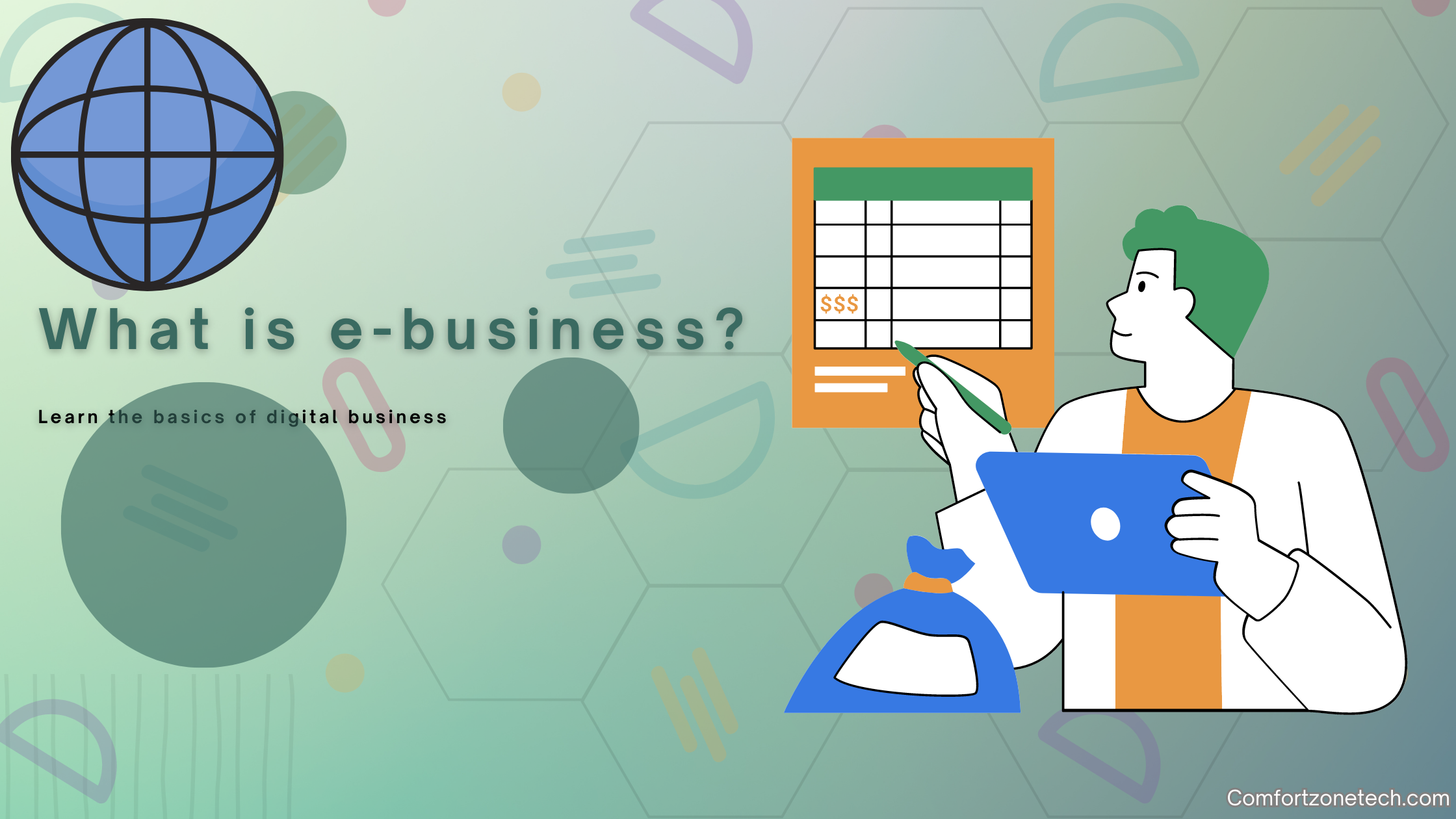In today’s fast-paced digital world, the concept of “what is e-business” has become ubiquitous and has changed the way companies operate, revolutionizing traditional business models. From established businesses to start-ups, understanding the basics of e-business is essential to thriving in the ever-changing digital business environment. This article will delve into the core aspects of e-business and discuss its definitions, models, benefits, challenges, success stories and future prospects.
Definition of what is e-business
E-business, short for Electronic Business, refers to the use of electronic technology for various business processes. It covers a wide range of activities including online buying and selling of goods and services, customer relationship management, electronic funds transfer, supply chain management and digital marketing. E -Commerce uses the functions of Internet, computer and other digital devices to simplify operations and improve overall efficiency.
E -Commerce Evolution
E -Comercia has many history and can be tracked up to the early stages of the Internet. With the advent of the World Wide Web in the 1990s, companies began to explore the potential of online platforms for business needs. The rapid development of technology combined with the growing popularity of the Internet has fueled the growth of e-business and paved the way for the digital revolution.
Types of e-business models
Business to business (B2B)
Business-to-business e-business involves transactions between two or more businesses. It facilitates the exchange of goods, services or information between companies in a digital environment. B2B e-business plays a key role in supply chain management, facilitating seamless collaboration between suppliers, manufacturers and distributors.
Business to consumer (B2C)
Business-to-consumer e-business focuses on transactions between businesses and individual consumers. This model allows businesses to reach their target audience directly through online platforms that offer a wide range of products and services. B2C e-business has revolutionized the retail industry, giving customers the convenience of shopping without leaving their homes.
Consumer to Consumer (C2C)
Consumer-to-consumer e-business facilitates transactions between individual consumers. Online marketplaces and platforms allow individuals to buy and sell products or services from one another. C2C e-business enables the sharing economy and empowers people to realize their assets and skills.
Consumer to Business (C2B)
Consumer-to-consumer e-business disrupts the traditional B2C model, where individual consumers provide products or services to businesses. This model is common in freelance platforms where companies seek the services of independent professionals and freelancers.
Business to Government (B2G)
Business-to-business e-business involves interactions between businesses and public authorities. It simplifies processes such as procurement, licensing and tax returns, reduces paperwork and increases efficiency.
The main components of e-business
What is e-business site
An e-business site acts as a company’s digital store, allowing customers to browse and purchase products online. A well-designed and user-friendly e-business website is essential to attract and retain customers.
Online market
Online marketplaces bring together multiple sellers and buyers on one platform. These markets offer a wide range of products and services, giving consumers a variety of choices.
Online payment system
A secure and efficient online payment system is essential for conducting e-business transactions. These systems ensure the protection of financial information when making online purchases.
Supply chain management
E-business relies on a strong supply chain management system to ensure a smooth flow of goods and services from the manufacturer to the end user. Digital technologies simplify inventory management and distribution processes.
Digital Marketing and Advertising
Digital marketing and advertising is an integral part of e-business, allowing businesses to reach a global audience and target specific customer segments. Social media, search engine optimization and email marketing are some common strategies.
Advantages of implementing e-business
Global Access and Availability
One of the main advantages of e-business is the ability to cross geographical boundaries. Businesses can attract customers from around the world and expand their market activity and potentially customer base. In addition, consumers can access products and services from anywhere to break the barriers of time and location.
Price Effectiveness
The concept of “what is e-business” saves businesses money by reducing the need for physical infrastructure and traditional retail space. In addition, online marketing is often more cost-effective than traditional advertising methods, making it an attractive option for startups and small businesses on a tight budget.
Personalization and Customer Experience
Digital platforms allow businesses to collect valuable data about customer preferences and behavior. Using this data, companies can personalize their offers and create a customized shopping experience that resonates with individual customers.
Data Analysis and Insights
E-business generates enormous amounts of data and provides companies with valuable insights into customer behavior, product performance and market trends. This data-driven analysis enables companies to make informed decisions and optimize their strategies to achieve better results.
Simplified Business Processes
Automated e-business processes simplify all aspects of business operations, reducing manual work and potential errors. From inventory management to order processing, digital technologies increase efficiency and productivity.
What are the challenges faced in the implementation of e-business?
Security and Privacy Concerns
E-business involves the transfer of sensitive data, including financial information and personal information. Strong security measures and ensuring data protection are critical to building consumer confidence and preventing data breaches.
Technology Integration
Implementing the term e-business often requires the integration of various digital tools and platforms. The process can be complex and require a lot of technical expertise to ensure smooth operation.
Digital distribution and access issues
Despite the advancement of technology, not everyone has equal access to the Internet and digital devices. The digital divide creates challenges for businesses to reach specific demographics.
Competitive landscape
The digital market is very competitive and many companies are fighting for consumers’ attention. Standing out from the competition requires strategic differentiation and an innovative approach.

What are e-business and success stories?
Amazon – Redefining Online Retail
Amazon is a pioneer in e-business. What started as an online bookstore offers a wide range of products and services in a large online marketplace. Amazon’s focus on customer experience, efficient logistics and data-driven personalization has made it a dominant force in the industry.
Alibaba – Strengthening Global Trade
Alibaba is a Chinese e-business giant that has revolutionized international trade. Platforms like Alibaba and AliExpress connect businesses and consumers around the world, facilitating cross-border transactions and driving business growth.
Uber – The Transportation Revolution
Uber disrupted the traditional taxi industry by introducing a peer-to-peer ride-sharing platform. Uber has changed the way people move around cities by offering convenient transportation services through an easy-to-use app.
Airbnb – Changing the Hotel Industry
Airbnb revolutionized the hospitality industry by allowing individuals to rent out their properties to travelers. This innovative approach offers unique accommodation options and an exciting travel experience.
What is the future of e-business?
Artificial Intelligence and Machine Learning
Artificial intelligence and machine learning technologies are expected to play a key role in improving e-business operations. From chatbots to customer support to personalized product recommendations, AI-powered solutions will transform the customer experience.
Internet of Things (IoT)
IoT will enable seamless connections between physical devices and online platforms, allowing companies to collect real-time data and improve supply chain and inventory management processes.
Augmented Reality (AR) and Virtual Reality (VR)
AR and VR technologies have the potential to change the way consumers interact with online products. Virtual samples, interactive product demonstrations and immersive shopping experiences are becoming commonplace.
Blockchain Technology
Blockchain’s decentralization and security will affect all aspects of e-business, from transparent supply chain tracking to secure payment processes and smart contracts.
Result
E-business has become a major driver of innovation and growth in the business world. With the changing environment, the use and development of digital technologies is essential for companies that want to thrive in a competitive global market. As e-business continues to grow, it will open up new opportunities and transform industries, shaping the future of commerce as we know it. Frequently Asked Questions
Questions (Frequently Asked Questions)
What is e-business?
E-business, short for electronic commerce, refers to the use of electronic technology for various business processes, including online buying and selling of goods and services, digital marketing and supply chain management.
What are the basic types of e-business models?
The most important e-business models are business-to-business (B2B), business-to-consumer (B2C), consumer-to-consumer (C2C), consumer-to-business (C2B) and business-to-government (B2G).
How can e-business benefit a business?
E-business offers many benefits, including global reach, cost efficiency, personalized customer experience, data analytics insights, and streamlined business processes.
What challenges do companies face when implementing e-business?
Some of the challenges of implementing e-business include security and privacy issues, complexity of technology integration, digital distribution issues and highly competitive markets.
Which companies have been successful in e-business?
Companies like Amazon, Alibaba, Uber and Airbnb are good examples of e-business success stories that show how digital technologies can transform traditional industries.




